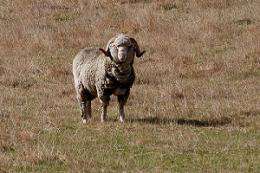Australian Merino sheep could fare better than expected over dry summers

Research comparing how popular breeds of sheep respond to nutritional stress have concluded Australian Merinos cope as well as Damara and Dorper breeds.
The study tested for the first time the common belief that the fat-tailed Damara and non-hair Dorper breeds adapt better to seasonal fluctuations in feed availability than the Australian Merino.
Seasonal weight loss is a challenge for farmers in WA and tropical climates. Hot, dry summers result in sparser ground cover and drier biomass that is harder for sheep to digest.
Many sheep lose weight or stop gaining weight from around October every year. Farmers typically supplement sheep diets with grain in March, which is an expensive and impractical measure.
The Department of Agriculture and Food Western Australia (DAFWA) and the University of Western Australia collaborated with a Portuguese researcher on the study.
Tim Scanlon, Farming Systems Development Officer at DAFWA, says, "With most livestock animals, you can tell within a few hundred grams of feed the productivity of those animals, but not with sheep because they aren't usually in a feeding system".
"So we wanted to find out if we put the different breeds on a rationed diet which ones were going to make the best use of that feed, not only maintaining but gaining weight, particularly going into the autumn period."
Mr Scanlon supervised the trial, which put 72 ram lambs on either a restricted diet or a growth diet for 42 days.
On the restricted diet all three breeds stopped losing bodyweight by Day 24, suggesting they can all adapt to periods of nutritional stress.
Damara sheep on the restricted diet performed better initially but lost more percentage weight than the other two breeds for the trial's midpoint.
"The Damaras were flighty and didn't take to confined feeding very well, but they are known as good foragers so in the field will probably fare better," Mr Scanlon says.
"But we found there were no significant differences between the breeds…and it comes down to how you want to manage them."
Management techniques vary with different breeds. Dorpers require more secure fencing as they escape enclosure easily and rotational grazing can maximise feed for Merinos.
The Australian Merino is the most common breed of sheep in Australia. Its European predecessor was introduced in 1804.
Farmers introduced the Southern African breeds Dorper and Damara in the 1990s believing they might be better-adapted to nutritional stress.
More information: www.smallruminantresearch.com/ … (12)00357-4/abstract
Provided by Science Network WA














